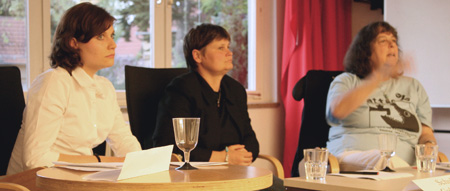One of the student initiatives during the Annual Conference was to stage a panel discussion, the focus of which would be the issues surrounding the ownership and management of Berlin’s water. This would be placed in the context of global concerns about water access and water management, both in general, and with specific reference to China. The invited experts were Eva Sternfeld (China Environment and Sustainable Development Reference and Research Centre), Mrs. Härlin (Attac; Berlin Wassertisch) and our guest speaker of the day Maude Barlow (Blue Planet Project). Much of the organization for the panel was carried out by Lena Schulze-Gabrechten (Germany) and the high point of her involvement was the privilege of moderating the discussion. Here she candidly describes how it felt to preside over a panel of experts, in front of a sizeable (and lively) audience of students, faculty, other invited guests and interested members of the general public [Ed].
‘I try to scan about forty faces in one gaze. Mainly interested faces (only one person obviously sleeping), and nobody looks at me in a shocked or irritated way – I call that potentially successful!
The audience in the ECLA lecture hall actually seem to follow the statements of the three women sitting to my left hand side: Eva Sternfeld, who worked for the China Environment and Sustainable Development Reference and Research Centre for eight years, Mrs Härlin, a member of Attac and the Berliner Wassertisch, and Maude Barlow, head of the Blue Planet Project and recipient of the Alternative Nobel Peace Prize. They are all gathered here to discuss water privatization, comparing Berlin’s experience with that of other countries, for example, those in the global South.
Aware of the setting and of my job as moderator, it crosses my mind that the first vision of this event I had was certainly different: we had originally had other locations in mind and surely somebody else would have been the host! Still, it now seemed fitting to be able to welcome our guests to ECLA for Annual Conference. So, back to reality: as I glance down at the paper in my hands I have a hard time trying to fit the next question to the panellist’s last answer, now fading rapidly from my mind… “Transition…?”; “Bridge…?”. What do they have in common? Water perhaps?
Maude saves me by directly answering the last remark and telling a funny story suiting the context. I am very grateful and feel the ground beneath my feet again. As I plan to leave at least twenty minutes for questions from the audience I check the time and cross out the next question but one. Then, as a second check, I look at Rafael Ziegler (faculty coordinator), with whom I organized the panel and, as I don’t feel any desperately hectic gestures directed at me, I feel supported in my time management.
“Mrs. Barlow, the Berlin case gives us an example of a public-private partnership in water distribution. As Mrs. Härlin pointed out, and as the movie that we watched, H2O for sale, underlines, it has not been a successful one. In your book The Blue Covenant you argue for a global water contract that only allows for the water supply to be held in public hands – you specifically mention public-public partnerships. Could you please elaborate on that?”
The panel discussion seems to stimulate questions and comments that would have comforted the missing representative from the Berliner Wasserbetriebe (Berlin’s water provider), whose empty chair and empty glass are on my right-hand side. After a slightly hesitant start the discussion becomes more passionate, taking up the respective benefits of democratic accountability on the side of a publicly-held water supply and, on the side of privatization, the desirability of the government’s being able to independently control the activity of a third party supplier. I am sorry that I have to cut off the last questions – but it is really time for water, wine and fingerfood…’
by Lena Schulze-Gabrechten (2008, Germany)

